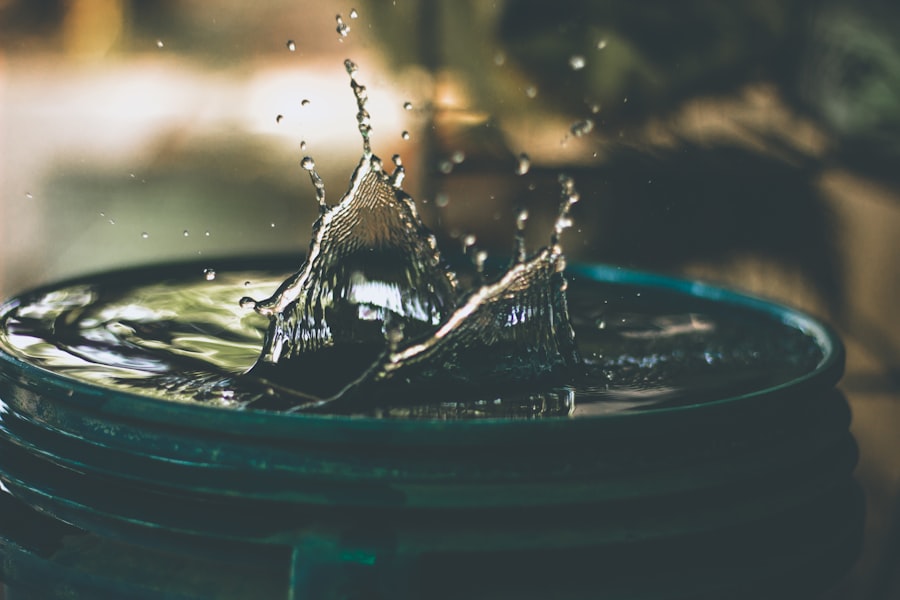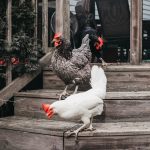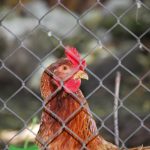During winter, chickens face a significant risk of dehydration due to frozen water sources. Lack of access to water can lead to dehydration in chickens, resulting in decreased egg production, poor feather quality, and potentially death in severe cases. Chickens may also be susceptible to frostbite if they cannot drink enough water to maintain proper hydration.
It is essential for chicken owners to understand these risks and take proactive measures to ensure their flock has constant access to unfrozen water. Chickens require more water during winter to regulate their body temperature and stay hydrated. When water sources freeze, chickens may be unable to consume sufficient water to meet their increased needs, leading to various health issues.
Chicken owners must be aware of the potential consequences of frozen water and implement preventive measures to avoid such situations.
Table of Contents
- 1 Choosing the right waterer for winter
- 2 Insulating the waterer
- 3 Using heated waterers
- 4 Providing warm water alternatives
- 5 Monitoring water sources regularly
- 6 Implementing other winter care practices for chickens
- 7 FAQs
- 7.1 What are the risks of water freezing for chickens in winter?
- 7.2 What are some methods to keep water from freezing for chickens in winter?
- 7.3 How often should I check on the water for my chickens in winter?
- 7.4 What are some signs that chickens are not getting enough water in winter?
- 7.5 Are there any natural ways to prevent water from freezing for chickens in winter?
Key Takeaways
- Frozen water can pose serious risks to chickens, including dehydration and decreased egg production.
- Choosing the right waterer for winter is crucial to ensure that chickens have access to unfrozen water.
- Insulating the waterer can help prevent water from freezing in cold temperatures.
- Heated waterers are an effective solution for keeping water unfrozen in winter.
- Providing warm water alternatives, such as adding hot water to the waterer, can help prevent freezing.
Choosing the right waterer for winter
Heated Waterers
One popular option is a heated waterer, which uses electricity to keep the water at a temperature above freezing. This type of waterer is ideal for extremely cold climates where water can freeze quickly.
Insulated Waterers and Heated Bases
Another option is an insulated waterer, which is designed to retain heat and prevent water from freezing for an extended period. Additionally, some chicken owners opt for heated bases that can be used with traditional waterers to prevent freezing. These bases are placed underneath the waterer and provide a constant source of heat to keep the water from freezing.
Factors to Consider
When choosing a waterer for winter, it is crucial to consider the size of the flock, the climate in which the chickens are kept, and the availability of electricity or other heating sources. By taking these factors into account, chicken owners can ensure their flock stays hydrated and healthy throughout the winter months.
Insulating the waterer

Insulating the waterer is an effective way to prevent water from freezing in cold weather. There are several methods for insulating a waterer, including using foam insulation, heat tape, or even wrapping the waterer in a thermal blanket. Insulation helps to retain heat and prevent the water from freezing, ensuring that chickens have access to unfrozen water at all times.
Additionally, placing the waterer in a sheltered area, such as inside the coop or a covered run, can also help to prevent freezing. By providing a barrier from the elements, the waterer is less likely to freeze, ensuring that chickens have access to water throughout the winter months. Insulating the waterer is an important step in winter care for chickens and can help to prevent dehydration and other health issues associated with frozen water sources.
Using heated waterers
Heated waterers are a popular choice for chicken owners looking to provide unfrozen water to their flock during the winter months. These waterers use electricity to keep the water at a temperature above freezing, ensuring that chickens have access to water at all times. Heated waterers come in a variety of sizes and styles, making it easy for chicken owners to find the right option for their flock.
Additionally, some heated waterers are designed with thermostats that automatically turn on when the temperature drops below freezing and turn off when it rises above freezing. This feature helps to conserve energy and ensure that the water remains at a consistent temperature. While heated waterers require access to electricity, they are an effective way to prevent frozen water and ensure that chickens stay properly hydrated during the winter months.
Providing warm water alternatives
In addition to heated waterers, there are other warm water alternatives that can be used to prevent freezing in cold weather. One option is to add warm water to the chickens’ drinking vessels multiple times throughout the day. This can help to temporarily raise the temperature of the water and prevent it from freezing for a short period of time.
Another alternative is to use insulated containers or buckets to hold the water. These containers are designed to retain heat and can help prevent freezing for an extended period of time. Additionally, some chicken owners use heated pet bowls or heated livestock watering tanks as warm water alternatives for their flock.
These options provide a constant source of heat to keep the water from freezing and ensure that chickens have access to unfrozen water.
Monitoring water sources regularly

Monitoring Water Sources
It is crucial for chicken owners to regularly check their flock’s water sources during the winter months. This involves inspecting for signs of freezing, such as ice forming on the surface of the water or around the edges of the container. By doing so, chicken owners can take proactive measures to prevent freezing and ensure their flock has access to unfrozen water at all times.
Inspecting Heated Waterers and Warm Water Alternatives
In addition to monitoring water sources, it is essential to check for any damage or malfunctions in heated waterers or other warm water alternatives. This includes examining cords for signs of wear or damage, ensuring that thermostats are functioning properly, and checking for any leaks or other issues that could lead to freezing.
Preventing Water Deprivation
By regularly monitoring water sources, chicken owners can identify and address any potential problems before they impact their flock’s access to water. This proactive approach helps prevent water deprivation, which can have severe consequences for the health and well-being of chickens.
Implementing other winter care practices for chickens
In addition to providing unfrozen water, there are several other winter care practices that chicken owners should implement to ensure their flock stays healthy during the colder months. This includes providing adequate shelter from the elements, such as insulated coops or windbreaks in outdoor runs. Additionally, providing extra bedding in the coop can help to keep chickens warm and comfortable during cold weather.
Furthermore, it is important to adjust feeding practices during the winter months to ensure that chickens are receiving enough nutrients to maintain their body temperature and stay healthy. This may include increasing their feed rations or providing supplemental treats high in fat and protein. Additionally, providing opportunities for exercise and fresh air can help chickens stay active and maintain their body temperature during the winter months.
In conclusion, preventing frozen water sources is crucial for maintaining the health and well-being of chickens during the winter months. By understanding the risks associated with frozen water and taking proactive measures such as choosing the right waterer, insulating the waterer, using heated waterers, providing warm water alternatives, monitoring water sources regularly, and implementing other winter care practices, chicken owners can ensure that their flock stays properly hydrated and healthy throughout the colder months.
If you’re looking for more tips on keeping your chickens comfortable in the winter, check out this article on what kind of coop is best for chickens. It offers valuable insights on creating a cozy and safe environment for your flock during the colder months.
FAQs
What are the risks of water freezing for chickens in winter?
Freezing water can lead to dehydration in chickens, which can cause health issues and decreased egg production. It can also be a challenge for chickens to find water to drink, leading to stress and reduced overall well-being.
What are some methods to keep water from freezing for chickens in winter?
Some methods to prevent water from freezing for chickens in winter include using heated waterers, insulating water containers, using heated bases, and using solar-powered water heaters. Additionally, some people use water-warming devices or add electrolytes to the water to lower its freezing point.
How often should I check on the water for my chickens in winter?
It is recommended to check on the water for chickens at least twice a day in winter, especially during very cold temperatures. This ensures that the water is not frozen and that the chickens have access to fresh, unfrozen water.
What are some signs that chickens are not getting enough water in winter?
Signs that chickens are not getting enough water in winter include decreased egg production, lethargy, reduced feed consumption, and abnormal behavior such as pecking at snow or ice. It’s important to monitor the water intake of chickens and address any issues promptly.
Are there any natural ways to prevent water from freezing for chickens in winter?
Some natural ways to prevent water from freezing for chickens in winter include using black containers to absorb heat from the sun, placing water containers in sunny areas, and using thermal mass such as rocks or bricks to retain heat and prevent freezing. However, these methods may not be as reliable in very cold temperatures.
Meet Walter, the feathered-friend fanatic of Florida! Nestled in the sunshine state, Walter struts through life with his feathered companions, clucking his way to happiness. With a coop that’s fancier than a five-star hotel, he’s the Don Juan of the chicken world. When he’s not teaching his hens to do the cha-cha, you’ll find him in a heated debate with his prized rooster, Sir Clucks-a-Lot. Walter’s poultry passion is no yolk; he’s the sunny-side-up guy you never knew you needed in your flock of friends!







